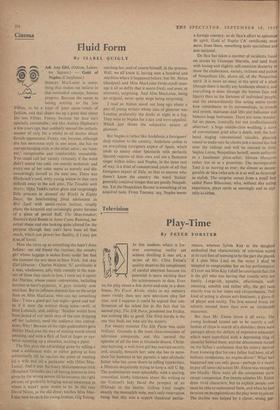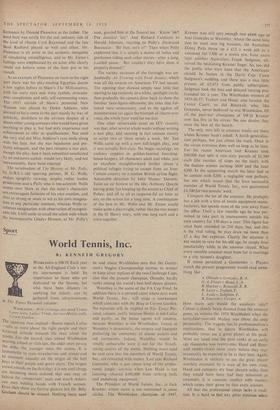Television
Play-Time
By PETER FORSTER
For twenty minutes The Silk Purse was quite brilliant. Granada is the most class-conscious of television companies, and this seemed the epitome of all the best in Granada drama. Christ- mas morning, a well-born girl has married secretly and, socially, beneath her; now she has to intro- duce her husband to her parents, a near-alcoholic father who has come down to selling typewriters, a Mamma desperately trying to keep a stiff U lip. The preliminaries went splendidly, with a searing, controlled, bitchy bitterness about the writing as the Colonel's lady faced the prospect of an O'Grady in the family. Gillian Lind caught exactly the memsahib note, one's only reservation being that this was a superb theatrical perfor-
mance, whereas Sylvia Kay as the daughter embodied that characteristic of television acting at its rare best of seeming to be the part she played. If I pass Miss Lind on the street I shall be tempted to congratulate her on her performance; if I ever see Miss Kay I shall be convinced that this is the girl who was having that trouble with her family. Large-ish, equable, affectionate, well- meaning, sensible and rather silly, the girl rang exactly true to her times and circumstances. This kind of acting is almost anti-histrionic, a glove-fit of player and reality. The first natural break for adverts seemed more than ever an intolerable misnomer.
But then Mr. Exton threw it all away. The young husband turned out to be merely a col- lection of chips in search of a shoulder; there were passages about the defects of expensive education which were superficial with a depressing ring of sincerity behind them; and the denouement turned on the father's confession that his misery derived from knowing that his own father had been, of all bathetic revelations, an engine-driver! What had happened one can only guess—perhaps in a desire to pay off some old scores Mr. Exton was swinging too blindly. Here were all the component parts except compassion. For twenty minutes Mr. Exton drew vivid characters, but to explain people you must be able to understand them, and when he had to move on to explanations the play went to pieces. The decline was helped by a clever, wrong per- formance by Donald Pleasence as the father. The need here was surely for the sad, unfunny side of the kind of chump Cyril Raymond and the late Basil Radford played so well and often; Mr. Pleasence is an artist in the sardonic, incapable. of simulating unintelligence, and so Mr. Exton's failings were emphasised by an actor who clearly could not believe some of the lines put in his mouth.
As an example of Pleasence on form in the right part there was his play-stealing Egyptian doctor a few nights before in Shaw's The Millionairtss, With his wary eyes and witty eyelids, avocado- pear complexion and soft, self-communing voice. The 1935 version of Shaw's perennial New Woman was played by Dawn Addams, who seemed to have come to the part mainly by way of publicity, doubtless to the envious despair of a dozen other young actresses who would have given anything to play it, but had only experience and achievement to offer as qualifications. Not until the very end did Miss Addants's eyes smile along with her face, but she was handsome and per- fectly adequate, and the part remains a star part. though the play, had it been submitted unsolicited by an unknown author, would very likely, and not unreasonably, have been rejected.
The serialisation of The History of Mr. Polly, by G.B.S.'s old sparring partner, H. G. Wells, makes sprightly viewing, despite, rather leaden Production and a Polly who is too actorish. Wells scores over Shaw in that the latter's characters are extravagant fantasies of his own creation, and thus as strong or weak in wit as his own imagina- tion at any particular moment, whereas Wells re- inforces imagination with observation of recognis- able life. I still smile to recall the relish with which the incomparable Gladys Henson, as Mr. Polly's aunt, greeted him at the funeral tea : 'Know 'im? I've dandled 'int!' And Richard Caldicptt as Harold Johnson, reacting, to Polly's illustrated Boccaccio: 'Bit free, isn't it?' Then when Polly explained that it. is simply a matter of ladies and gentlemen telling each other stories—after a long, pazzled pause : But couldn't they have done it properly dressed?'
The variety occasion of the fortnight was un- doubtedly An Evening with Fred Astaire, which won all the awards on American TV last season. The opening shot showed simply neat little 'feet starting to tap restlessly in a.white, spotlight circle, then gradually the camera drew back to show the familiar faun-figure silhouette; the titles that fol- lowed were unnecessary, and as the ageless elf demonstrated yet again the triumph of .charm over voice, the whole hour went' far too fast.
One other remarkable event on ITV, recently was that, after several whole weeks without writing a new play, and seeming in fact content merely to script two or three serials a week, Mr. Ted Willis came up with a new full-length play, and it was actually first-class. No bogus sociology, no cockney coppers or golden-hearted boarding- house-keepers, all characters adult and white, just an excellent straightforward thriller about 'a political refugee trying to escape from an Iron- Curtain country on a routine British airline flight. Admirable direction by John Moxey; Dorothy Tutin an air hostess to the life; Anthony Quayle having great fun keeping up the accent as Chief of Police; and all in all as suspense-ful an hour as any on the screen for a long time. A combination of the best in Mr. Willis and Mr. Exton would make quite a playwright, rather like thetwo tenors in the 0. Henry story, with one lung each and a voice together.











































 Previous page
Previous page